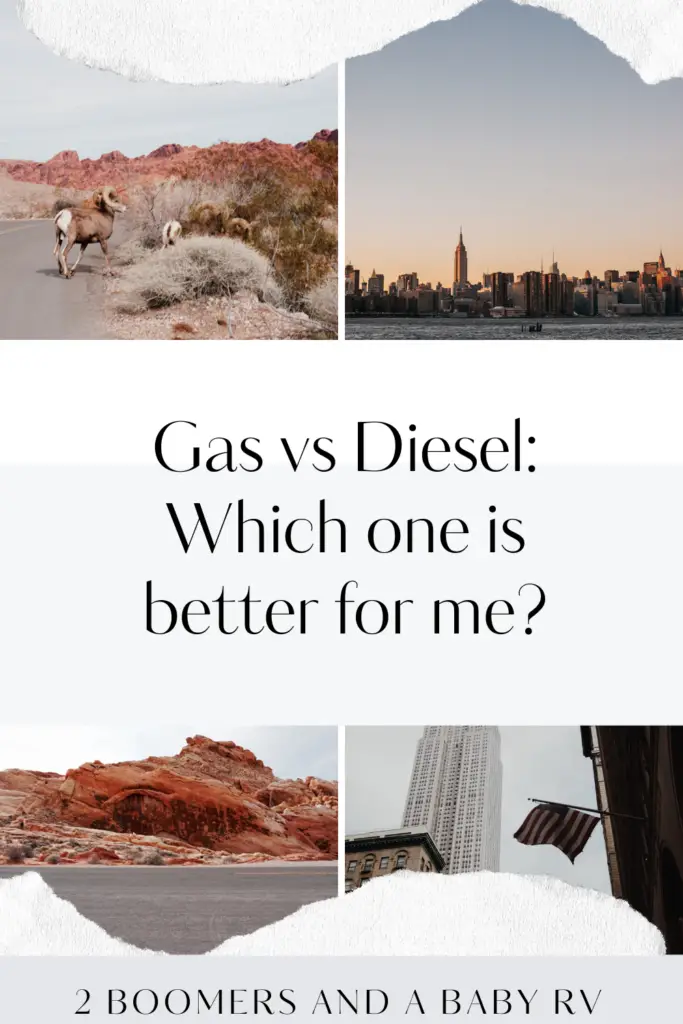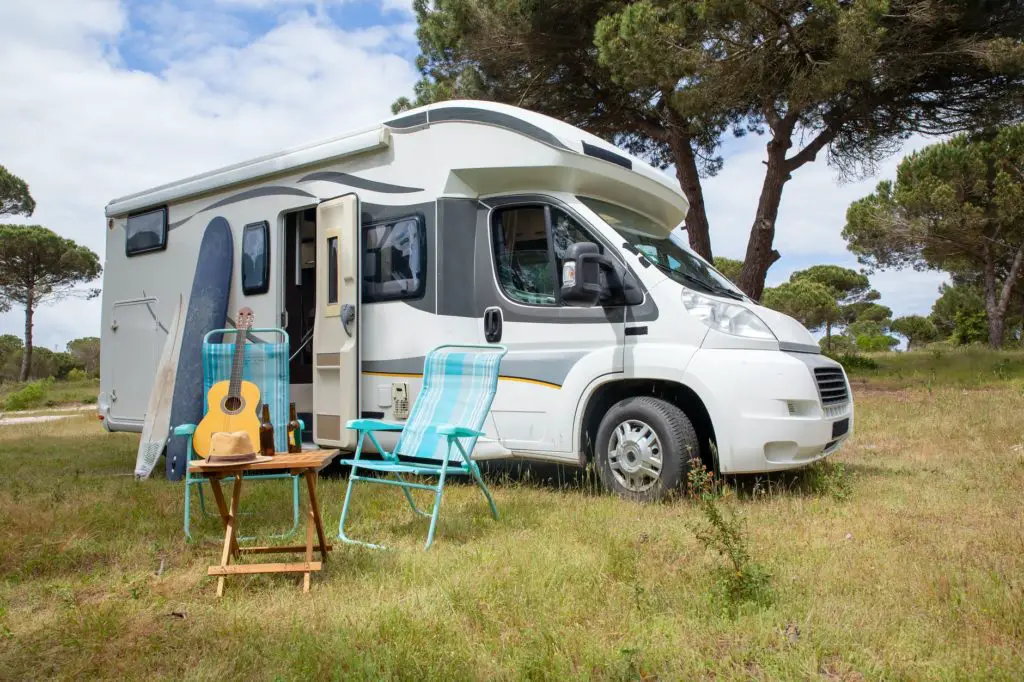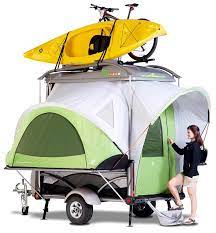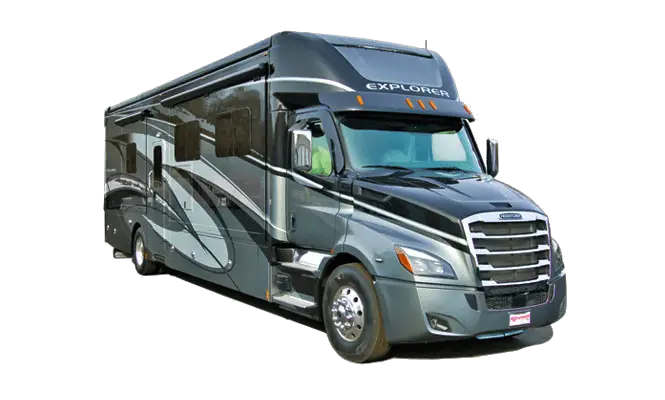As you can imagine, this is a highly debated topic that really has to do with a personal experience more than anything. I think you can make a case for either, depending on your needs and expectations. We will try to help by finding the good and bad for both gas and diesel models. So let’s find out when it comes to Gas vs Diesel RV, which better engine for you.
Is Gas or Diesel better?
When shopping for an RV and deciding between a diesel vs. gas motorhome, many variables come into play. For strictly fuel economy, diesel motorhomes are much more fuel-efficient. If the purchase price is your determining factor, then a gas engine RV will cost significantly less. Towing power will go to the diesel engine and finding places that can perform maintenance goes to gas. As you can see, deciding which one is better really depends on what you will be using your RV for mainly.
Will will highlight some of the pluses and minuses for each and hopefully help you make an educated decision on the engine that will work best for your situation.

What is a diesel RV engine and how does it work?
A diesel engine is an internal combustion engine in which ignition of the fuel is caused by the elevated temperature of the air in the cylinder due to mechanical compression; thus, the diesel engine is a so-called compression-ignition engine (CI engine).
Diesel engines work by compressing only air, or air plus residual combustion gases from the exhaust (known as exhaust gas recirculation (EGR)). Air is inducted into the chamber during the intake stroke and compressed during the compression stroke. This increases the air temperature inside the cylinder to such a high degree that atomized diesel fuel injected into the combustion chamber ignites.
The diesel engine has the highest thermal efficiency (engine efficiency) of any practical internal or external combustion engine due to its very high expansion ratio and inherent lean burn which enables heat dissipation by the excess air.
What is a gas RV engine and how does it work?
A gas engine or an internal combustion engine is a motor that is powered by the expansion of gas which is created by the combustion of hydrocarbon gas fuels. To elaborate, internal combustion used the heat of combustion created by the injected hydrocarbon fuel to create mechanical motion.
Internal combustion engines function with the concept of a piston being pushed by the pressure of a certain explosion. This explosion is burning the hydrocarbon within the cylinder head and engine.
The pistons in turn rotate the crankshaft and ultimately, through a system of gears in the powertrain, this motion drives the vehicle’s wheels.
Gas vs Diesel RV which gets better gas mileage?
If we are strictly talking about fuel efficiency, diesel motorhomes use much less fuel than their gas counterparts. The reasoning behind this starts with diesel fuel having a greater energy value than gasoline does. Its higher energy density means that diesel fuel can offer up to 10 percent better fuel economy by volume.
A diesel engine provides more torque which in turn gets you better fuel economy, power, and acceleration.
Diesel Engine – On average you can get between 8-16 MPG with a diesel RV, this really depends on the size of the rig. A smaller class B diesel RV would of course get much better than a large class A diesel pusher.
Gas Engine – An RV using a gas engine can expect between 6-12 MPG, again depending on the size, payload, and driving style/terrain.
Why is a diesel RV more expensive than gas?
The main reason for the high price tag is the cost of engine maintenance. These engines take a specialized mechanic and most repair stations are not qualified to perform needed repairs. Most likely you are not going to be able to drop your diesel engine off at Bob’s garage on a Saturday afternoon to get an oil change.
On the bright side, you will be able to log more miles and time between visits to the repair shop with a diesel engine in your RV.

Will a gas or diesel engine last longer?
A diesel engine that is properly cared for can last 500K+ miles and still be a good worker for you. While a gas engine with the same care might need to be replaced at around 125K – 175K miles. Each person has different driving styles and their RV is asked to perform different duties. This all needs to be taken into account, so the above mileages can fluctuate greatly on how a vehicle is used and cared for.
With less horsepower, a diesel engine works less hard than its gas counterpart. A gas engine, in turn, runs at a much higher RPM and this adds to its wear and tear.
A diesel engine provides more torque which in turn gets you better fuel economy, power and acceleration
Does a diesel engine have more power than a gas?
A diesel engine has more power than a gas engine. This is due to the turbocharger increasing compression inside of cylinders which in turn creates more torque. The added torque allows the vehicle to maintain speed while climbing hills and move more weight. A diesel engine’s tow capacity can be between 10K to 20K pounds. Where a gas engine has a towing capacity of between 3500 and 10K pounds.
Example: a Ford 6.8 Liter V-10 Engine; Torque 457lb-ft @ 3250 rpm; horsepower 362hp vs Cummins 6.7 liter Engine; Torque 660lb-ft @ 1600 rpm; horsepower 300hp. As you can see the diesel engine produces much more torque while producing less horsepower.
Is a gas or diesel engine in my RV more expensive when it comes to my insurance?
Diesel motorhomes are more expensive than their gas counterpart on average but that is all not because of the engine type. Most diesel engines are in larger class A motorhomes which of course are going to cost more when it comes to insurance costs.
When insuring an RV has a few extras that you won’t see when it comes to car insurance or homeowners insurance.
Including things like:
- Comprehensive and Collision
- Liability
- Personal Injury (you and a third party)
- Property Damage
- Vacation Loss (your vacation is ruined due to an accident)
- Car rental (not RV rental)
- Roadside Assistance
In 2020 the cost of insurance for a new class A motorhome for a year ranged between $1200 to $4500 depending on the rig and the state where the policy was taken out.
Many factors that come into play that affect your RV insurance rate include gas vs diesel RV, your driving record, and where you live or where your domicile is. If you bundle your home and/or auto and RV insurance, you may be eligible for discounts.
However, when it comes to the rates between gas vs diesel RVs, here’s the bottom line. Diesel RVs cost more to insure than gas RVs.
Make sure you have the right coverage
Roadside Assistance Guide
Gas vs Diesel RV – Winners and Losers
Power – Diesel
Fuel Economy – Diesel
Price – Gas
Longevity – Diesel
Repair cost – Gas
Maintenance convenience – Gas
Maintenance frequency – Diesel
Fuel cost – Gas (currently)
Finding fueling stations – Gas
Performance in the elements – Gas
Climbing hills – Diesel
As you can see there are arguments for either a gas engine or a diesel. What you really need to decide is your needs from an engine. We will give you some questions to answer below and try to help you make an informed decision on which would be better for you.
Life with a Diesel vs Gas RV expectations
[wptb id=7508]Things to take into account before you start shopping
How often do you plan on traveling in your RV? Diesel RVs like to be driven often unlike a gas engine that can sit for short periods of time with no negative effects.
Do you plan on towing with your RV? Car, boat, or trailer – Diesel has the power to bring along some toys.
Will you be traveling in mountainous regions? Climbing hills can be tough with gas, especially if you are planning to be towing a vehicle or trailer behind your RV.
Are trips to fill up on fuel an issue? Gas will burn the fuel faster, but easier to find stations.
Will you be able to find places to repair your vehicle? Diesel is a specialized engine. Repairs and regular maintenance need to be taken to a technician that is trained in diesel engines.
What size RV are you looking for? A diesel pusher class A, super C, or just a small Class B.
How much are you budgeting for your purchase? The purchase price for a diesel engine is substantially more than with a gas engine. On the other hand, a diesel engine has a longer life and usually requires less maintenance or repairs.
Conclusion
Diesel rigs are more expensive. That is probably the biggest point of differentiation, but for this extra cost, you also get an engine with a much longer life and higher resale value.
The gas engine is less expensive and finding a repair shop can be less of a chore than with diesel. On the other hand, you will be at the repair shop more often in most cases.
These are all things you need to take into account when shopping for an RV. What works for you may not be a good choice for another. This is the main reason it is such a highly debated topic, to begin with.
The bottom line is one is not better than the other and the choice depends on your unique travel needs.
You need to figure out how you will be traveling and if a diesel is worth that extra money or will a gas engine serve you best.
Do what is best for you!
Now, let’s get out there and have some fun!



